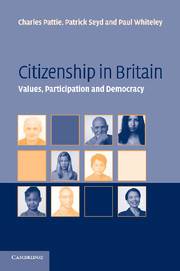Book contents
- Frontmatter
- Contents
- List of Figures
- List of Tables
- Acknowledgements
- Preface
- 1 What is Citizenship?
- I Understanding Citizenship
- II Modelling Citizenship
- III The Consequences of Citizenship
- 7 So What? The Consequences
- 8 The Dynamics of Citizenship
- 9 Challenges to Citizenship in Contemporary Britain
- Appendices
- Bibliography
- Index
8 - The Dynamics of Citizenship
Published online by Cambridge University Press: 22 September 2009
- Frontmatter
- Contents
- List of Figures
- List of Tables
- Acknowledgements
- Preface
- 1 What is Citizenship?
- I Understanding Citizenship
- II Modelling Citizenship
- III The Consequences of Citizenship
- 7 So What? The Consequences
- 8 The Dynamics of Citizenship
- 9 Challenges to Citizenship in Contemporary Britain
- Appendices
- Bibliography
- Index
Summary
As we have seen in earlier chapters, a frequent claim in recent academic and popular discussions of civic life in Western democracies has been that public involvement in politics is on the decline and democracy is in crisis (Norris, 1999; Pharr and Putnam, 1999). But the evidence for such claims is sometimes weak, not least because the relative absence of time-series data makes it difficult to generalise accurately about trends in many aspects of civic engagement. Nevertheless, where we can measure change over time, indicators are not always encouraging (Norris, 2002). For instance, United Kingdom general election turnout data reveal a trendless fluctuation in the thirteen post-war elections between 1945 and 1992, but then in the most recent two a significant decline (Pattie and Johnston, 2001a; Clarke et al., 2004). In addition, there is evidence of declining participation in political parties (Seyd and Whiteley, 2002a; Whiteley and Seyd, 2002), and declining trust in political leaders and institutions (Bromley, Curtice and Seyd, 2001). Similar patterns of declining civic engagement are apparent in other advanced industrialised countries (Norris, 1999). Explanations of these developments vary, but most commonly they include a discussion of dwindling social capital (Putnam, 2000), weakening networks of civic engagement (Verba, Schlozman and Brady, 1995), and declining cognitive engagement (Huckfeldt and Sprague, 1995).
The apparent evidence of malaise in the Western body politic also extends to worries about public attitudes towards the political system. Scandals and government failure are felt to have eroded popular trust in politicians and state institutions.
- Type
- Chapter
- Information
- Citizenship in BritainValues, Participation and Democracy, pp. 224 - 261Publisher: Cambridge University PressPrint publication year: 2004



